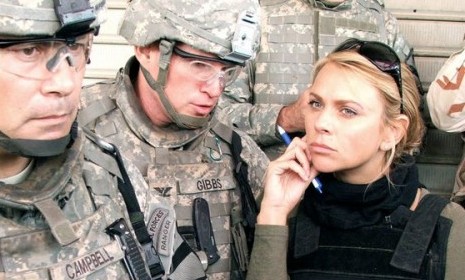The sexual assault of Lara Logan: What's the fallout for female journalists?
In the aftermath of the disturbing attack on the CBS correspondent in Egypt, media organizations face tough questions about female reporters' safety

A free daily email with the biggest news stories of the day – and the best features from TheWeek.com
You are now subscribed
Your newsletter sign-up was successful
CBS News announced yesterday that its chief foreign correspondent Lara Logan had been the victim of "brutal and sustained sexual assault and beating" while covering the celebrations in Egypt on the eve of President Mubarak's resignation. The correspondent was quickly flown back to the U.S. on Saturday morning, and hospitalized upon her return. She was released today, and is said to be "in remarkably good spirits despite her ordeal." But even as Logan recuperates, many wonder what her treatment at the hands of an Egyptian mob augurs for female reporters in the field:
The media will protect its reporters better: We can only hope this awful news will lead to a "broader push by the Fourth Estate to protect correspondents against assault," says Mac McClelland at Mother Jones. Already, the Committee to Protect Journalists has said it will add a section on sexual assault to its safety handbook. "It's about damn time," too. Already, "too many journalists have suffered similar horrors."
"What journalism might learn from the Lara Logan story"
The Week
Escape your echo chamber. Get the facts behind the news, plus analysis from multiple perspectives.

Sign up for The Week's Free Newsletters
From our morning news briefing to a weekly Good News Newsletter, get the best of The Week delivered directly to your inbox.
From our morning news briefing to a weekly Good News Newsletter, get the best of The Week delivered directly to your inbox.
We'll learn to better value female reporters: "Rape is a risk that comes with the job," and female journalists "face greater threats to their safety than male reporters do in similar situations," says Ann Friedman at Feministing. But women can also "gain greater access to certain sources," by dint of their gender. Would rape survivors in Haiti have opened up to male reporters, for example? It's vitally important we safeguard our women reporters, on feminist grounds — and "journalistic grounds, too."
"When rape is a risk that comes with the job"
And we'll be more open about the dangers they face: Many female reporters face sexual harassment and worse in their line of work, says Laila Lalami at The Nation. But they "rarely report it for fear of losing assignments." For Logan to come forward about her assault breaks this "powerful taboo" once and for all.
"The attack on Lara Logan: war of the words"
A free daily email with the biggest news stories of the day – and the best features from TheWeek.com
-
 The ‘ravenous’ demand for Cornish minerals
The ‘ravenous’ demand for Cornish mineralsUnder the Radar Growing need for critical minerals to power tech has intensified ‘appetite’ for lithium, which could be a ‘huge boon’ for local economy
-
 Why are election experts taking Trump’s midterm threats seriously?
Why are election experts taking Trump’s midterm threats seriously?IN THE SPOTLIGHT As the president muses about polling place deployments and a centralized electoral system aimed at one-party control, lawmakers are taking this administration at its word
-
 ‘Restaurateurs have become millionaires’
‘Restaurateurs have become millionaires’Instant Opinion Opinion, comment and editorials of the day